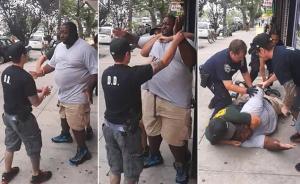Ironically, I’m writing a post decrying ‘angry black women’ because I’m feeling bitter and black tonight. It’s been a tough couple weeks for American Blacks with both Mike Brown and Eric Garner joining the scores of black people killed at the hands of police. On a depressing episode of the Read the hosts tried to keep our spirits up with news of Black Excellence. To support beautiful black women, I went out to buy the new W Magazine with Iman on the cover, but it wasn’t out yet, instead I bought a copy of bitch magazine with an article on ‘the Myth of the Strong Black Woman.’ In it, Tamara Winfrey Harris describes the myth of the sassy no-nonsense ladies, “the cold, overeducated, work obsessed woman” who is “half as likely to marry as white women.”
I just finished reading Chimamanda Adichie’s ‘Americanah,’ which lived up to all the hype, as far as I’m concerned. I was excited to hear what my Slate friends had to say on the Audio Book Club (like all podcast listeners I have an imagined relationship with them) and was so disappointed to hear their criticisms. While I loved the book, I think there are many things you can criticize it for. I too felt like the romance was not the strongest part of the book. But The Audio Book Club argued that it wasn’t believable that such a strong female protagonist would do something so weak, selfish and cruel. Emily Bazelon, friend to the blacks was the strongest champion of this opinion. I am so disappointed that these critics, even after reading a book that exposes and challenges these stereotypes, could not get past the idea of the strong black woman. It was unebelievable to them that a woman could be strong in her sense of self, but be ‘weak’ or vulnerable. Haven’t they seen the new stereotype of a woman who has it together in her work life, but can’t get it together in her personal life (have they missed Mindy’s character on the Mindy Project)?
What will it take to convince people to stop thinking of black people as animals? We are strong women, we have to be to withstand the racism and sexism of this culture. Some American blacks come from a line of women who survived the middle passage, who survived the back-breaking work of slavery. That doesn’t mean we don’t feel pain the same as whites. We are independent and capable, but we aren’t invincible. Strength should not be the only positive attribute a black woman can own, we are sensitive and vulnerable too and this is not weakness, this is powerful, this is what it means to be human.
Updated 10/13/14:
In which other white people on slate have trouble understanding why black people idolize white people (hint: there are a lot more white people in the US to idolize than black ones):
http://www.slate.com/articles/podcasts/the_audio_book_club/2014/09/roxane_gay_s_bad_feminist_book_club_discussion_guide_and_podcast.html
from the Gawker Review of Books Interview of Charles Blow:
First comes the recognition that we are devaluing black and brown bodies. And that that is not even a new phenomenon, that that is an extension of an American phenomenon, in fact it is even a world phenomenon. There is a mountain of social science that ranges from doctors not prescribing pain medication to black kids at the same rate as they do for white kids with similar illnesses to spanking being more prevalent among black boys. When you think about that body, and the violence that it must endure—
Right, like the word Ta-Nehisi Coates’s constantly used in his reparations essay, “plunder.” It’s similar to what he was getting at. I keep thinking about how there is not only always something coming at us, but something being taken from us.
Right. And endurance becomes this ambient thing in your life; it becomes your constant. It is not just to play and grow up and fall in love, but it is to endure. It becomes the paramount motivation in your life. The tragedy when you hear young men say, Oh I never thought I’d be 18 or 21 without going to jail or being in the grave. I’ve heard this too much. If that is being drilled into your mind, what kind of psychological damage does that do to you, and to your relationship to society? And in addition to that, whatever damage is being done, society is amplifying the damage by misconstruing the data and concepts so that we overestimate black crime, we overestimate black hostility, we overestimate black aggression. We ascribe it everything dark and negative. In that kind of hostile milieu of black bodies that have been tortured in a way, in a system that is designed to destroy it, these concepts of black being dangerous and wrong, you can have the unfortunate crossing of those wires and you get shootings. I don’t know how to fix that. I don’t know if I’m equipped to answer that.
Maybe not “fix,” but you’re in a very powerful post at the Times. You have a platform every week to talk about whatever you want, or at least what’s topical in the news, do you—
Well, my job is to shine a light. Illuminating and educating as best I can is the tool that I have. Other people have different tools. And hopefully they can use what I do in their advocacy, in their boots-on-the-ground sort of work in neighborhoods, changing minds person to person. Other than that, I’m not sure how it changes.
